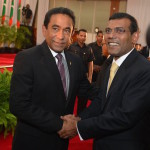“The Maldives should be seen as a microcosm of many aspects of struggles taking place throughout the world: long-standing elites exert a retrograde influence on rights, democracy and social freedoms, and by doing so they help themselves to profit from corruption, cronyism, and the enervation or breakdown of democratic institutions,” writes Matt Mullberry for Open Democracy.
“Accordingly, civil resistance becomes the necessary mechanism for people to try to save democratic practices and individual rights.
This same dynamic played out in South Africa during the long struggle against apartheid, in the Philippines in the 1980s, and during the Arab Spring. Within all these struggles, the concern and action of other governments, especially those in the democratic world, had a serious impact.
Here the stakes are just as large, albeit in a remote island nation. The international community has the opportunity to defend a set of democratic ideals to which it has long paid lip service, at a very low cost, and by doing so affect the lives and fortunes of a nation’s people.
The question right now is simple: Will international actors who believe in genuine democracy be consistent in defending it, regardless of the stakes and the context?”




